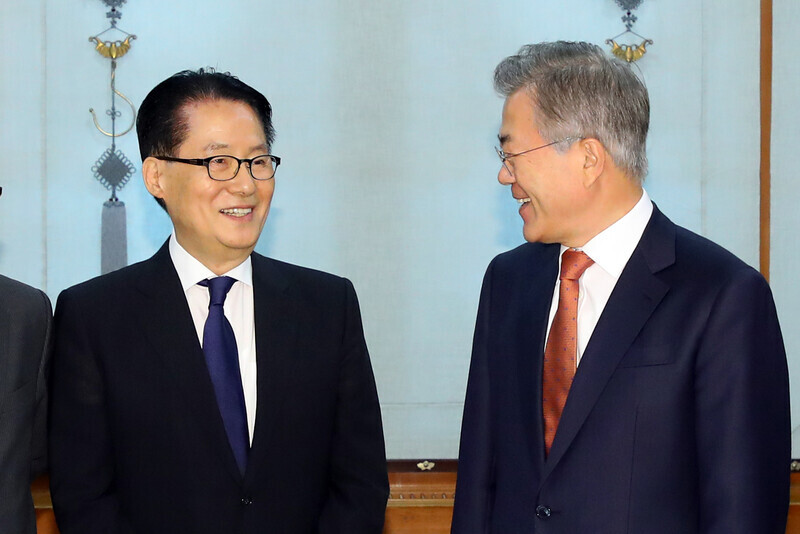hankyoreh
Links to other country sites 다른 나라 사이트 링크
Park Jie-won’s nomination as NIS director seen as message to the US and N. Korea
Observers hope for more proactive measures towards improving inter-Korean relations

Key figures in the ruling Democratic Party are viewing the surprise nomination of Park Jie-won to head the National Intelligence Service (NIS) as a message that signals a strong commitment to improving inter-Korean relations while urging the US government to adopt a more forward-looking stance.
Meeting with reporters on July 5, a key Blue House official explained that Park’s nomination was fully the decision of President Moon Jae-in and carried multiple layers of meaning. “The recommendation [to add Park to the national security] team came through various channels,” the official said, before adding that the “traffic control by bringing him on board as NIS director was 100% President Moon’s decision.”
Most crucially, Moon appears to have taken note of Park’s ongoing calls for the administration to move proactively and aggressively to improve ties with Pyongyang. Park, who helped orchestrate the first-ever inter-Korean summit in June 2000 as the culture and tourism minister, has advocated a proactive “autonomy” approach in multiple interviews, claiming that the US was “responsible for the strain on inter-Korean relations” and maintaining that the unification minister should “have it out with the US when there are problems with it being too excessive with its sanctions [against North Korea].”
Indeed, Park has expressed the strong conviction that while South Korea-US coordination is essential for the establishment of peace on the Korean Peninsula, the South Korean government should not allow itself to be unilaterally swayed by the US’ positions. For this reason, some observers in and around the Blue House have said that his nomination as the NIS director carries the message that South and North Korea will do more to speed along improvements in their relationship -- and that the US should present a more forward-looking stance in response.
Regarding Moon’s decision to make Park the NIS director, the Blue House only said that it came shortly after a luncheon on June 17 with veteran figures involved in inter-Korean relations. During that luncheon, Park discussed the administration’s failure to take proactive measures against the scattering of propaganda leaflets by North Korean defector groups. At the time, he stressed that a “law must be enacted to prohibit the leaflet scattering.”
The Blue House took great care to maintain security during the roughly two-week vetting of Park that followed. Even within the Blue House, only a select few officials were aware of his nomination, sources said. A frequent presence on broadcasts, Park appeared on one live program as recently as 15 minutes before the announcement of his nomination without letting on. During that final appearance, he “significantly” delivered a farewell message expressing “thanks for having me on” -- but no one understood the significance at the time.
By Seong Yeon-cheol, staff reporter
Please direct comments or questions to [english@hani.co.kr]

Editorial・opinion
![[Column] Park Geun-hye déjà vu in Yoon Suk-yeol [Column] Park Geun-hye déjà vu in Yoon Suk-yeol](https://flexible.img.hani.co.kr/flexible/normal/500/300/imgdb/original/2024/0424/651713945113788.jpg) [Column] Park Geun-hye déjà vu in Yoon Suk-yeol
[Column] Park Geun-hye déjà vu in Yoon Suk-yeol![[Editorial] New weight of N. Korea’s nuclear threats makes dialogue all the more urgent [Editorial] New weight of N. Korea’s nuclear threats makes dialogue all the more urgent](https://flexible.img.hani.co.kr/flexible/normal/500/300/imgdb/original/2024/0424/7317139454662664.jpg) [Editorial] New weight of N. Korea’s nuclear threats makes dialogue all the more urgent
[Editorial] New weight of N. Korea’s nuclear threats makes dialogue all the more urgent- [Guest essay] The real reason Korea’s new right wants to dub Rhee a founding father
- [Column] ‘Choson’: Is it time we start referring to N. Korea in its own terms?
- [Editorial] Japan’s rewriting of history with Korea has gone too far
- [Column] The president’s questionable capacity for dialogue
- [Column] Are chaebol firms just pizza pies for families to divvy up as they please?
- [Column] Has Korea, too, crossed the Rubicon on China?
- [Correspondent’s column] In Japan’s alliance with US, echoes of its past alliances with UK
- [Editorial] Does Yoon think the Korean public is wrong?
Most viewed articles
- 1‘We must say no’: Seoul defense chief on Korean, USFK involvement in hypothetical Taiwan crisis
- 2N. Korean delegation’s trip to Iran shows how Pyongyang is leveraging ties with Moscow
- 3Amnesty notes ‘erosion’ of freedom of expression in Korea in annual human rights report
- 4[Column] Park Geun-hye déjà vu in Yoon Suk-yeol
- 5‘Weddingflation’ breaks the bank for Korean couples-to-be
- 6[Reportage] On US campuses, student risk arrest as they call for divestment from Israel
- 7[Editorial] New weight of N. Korea’s nuclear threats makes dialogue all the more urgent
- 8Korea sees more deaths than births for 52nd consecutive month in February
- 9Will NewJeans end up collateral damage in internal feud at K-pop juggernaut Hybe?
- 10Why Korea shouldn’t welcome Japan’s newly beefed up defense cooperation with US